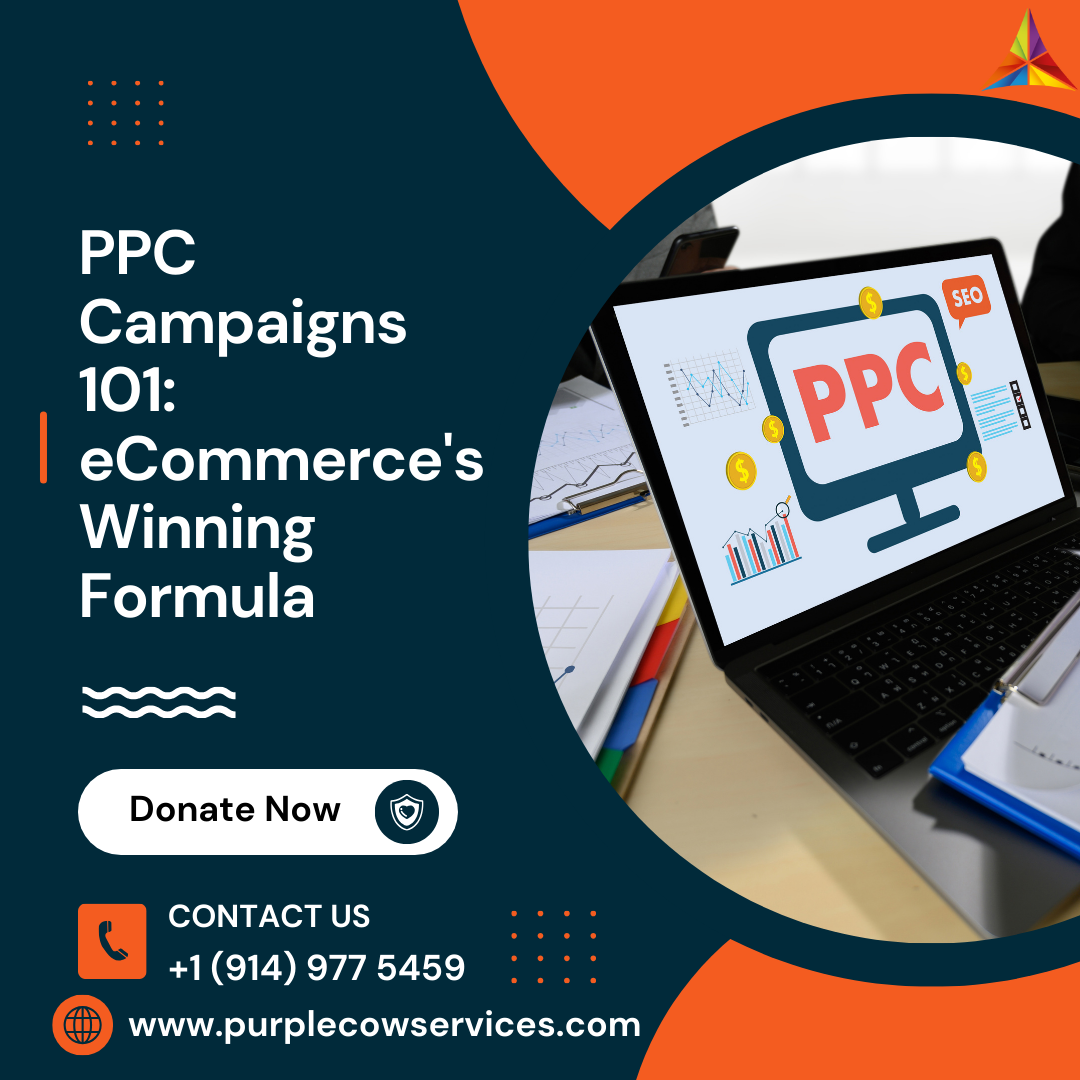In the ever-evolving landscape of digital marketing, Pay-Per-Click (PPC) campaigns have emerged as a cornerstone of success for eCommerce businesses. Leveraging platforms like Google Ads and Amazon PPC Campaigns, eCommerce retailers can propel their brands to new heights, reaching a vast audience and driving conversions. In this comprehensive guide, we’ll unveil the winning formula for eCommerce PPC campaigns, equipping you with the strategies and insights needed to navigate this dynamic realm.
Understanding the Power of PPC Campaigns
Before delving into the intricacies of eCommerce PPC campaigns, it’s essential to grasp the fundamental concept. PPC advertising is a paid digital marketing strategy in which advertisers pay a fee each time their ad is clicked. It’s a cost-effective approach to directing traffic to your eCommerce website, as you only pay when a user takes action by clicking on your ad.
The Role of Keywords in eCommerce PPC Campaigns
Keyword Research: The Foundation of Success
Keywords are the lifeblood of PPC campaigns. Conducting thorough keyword research is the first step towards building a successful eCommerce PPC campaign. Start by identifying relevant keywords that align with your products or services. Tools like Google’s Keyword Planner and third-party platforms can assist in uncovering high-potential keywords.
Once you’ve compiled a list of keywords, consider their search volume, competition level, and relevance to your eCommerce offerings. Aim for a balance between high-search-volume keywords and long-tail keywords that are specific to your products. These long-tail keywords often have less competition and can yield higher conversion rates.
Negative Keywords: Streamlining Your Campaign
In addition to selecting keywords to target, eCommerce PPC campaigns benefit from the inclusion of negative keywords. These are words or phrases for which you do not want your ads to appear. By adding negative keywords, you can refine your campaign’s targeting, ensuring that your ads are displayed to users most likely to convert.
For example, if you sell high-end luxury watches, you may want to add “cheap” or “discount” as negative keywords. This prevents your ads from appearing in searches related to inexpensive or discounted watches, ensuring that you reach a more qualified audience.
Crafting Compelling Ad Copy
The Art of Ad Copywriting
Once you’ve laid the groundwork with keyword research, it’s time to create compelling ad copy that resonates with your target audience. Effective ad copy is concise, persuasive, and tailored to the searcher’s intent.
Consider the user’s journey and where they are in the sales funnel. Are they researching products or ready to make a purchase? Craft ad copy that addresses their specific needs and guides them towards taking action.
Ad Extensions: Enhancing Visibility
In the world of eCommerce PPC campaigns, ad extensions are valuable tools for enhancing ad visibility and providing users with more information. These extensions include site link extensions, callout extensions, and structured snippet extensions, among others.
Site link extensions, for instance, allow you to showcase additional links to specific pages on your eCommerce website. Whether it’s highlighting product categories, promoting special offers, or emphasizing free shipping, ad extensions provide an opportunity to capture the user’s attention and drive clicks.
Setting and Managing Budgets
Determining Your PPC Budget
Effective budget management is essential for the success of eCommerce PPC campaigns. It’s important to establish a realistic budget that aligns with your business goals and allows for a competitive presence in the digital advertising landscape.
Consider factors such as the competitiveness of your industry, the cost-per-click (CPC) for your chosen keywords, and your desired return on investment (ROI). Calculating your maximum CPC and monitoring your campaign’s performance will help you make informed budget decisions.
Daily Budget vs. Lifetime Budget
In platforms like Google Ads, advertisers have the option to set either a daily budget or a lifetime budget for their campaigns. A daily budget specifies the maximum amount you’re willing to spend in a single day, while a lifetime budget sets a cap on your total spending for the duration of the campaign.
Choosing between the two depends on your campaign objectives and how you want to allocate your budget over time. Daily budgets provide more control over daily spending, while lifetime budgets offer flexibility in pacing spending throughout the campaign’s duration.
Ad Position and Quality Score
The Importance of Ad Position
Ad position plays a significant role in the visibility of your eCommerce PPC campaigns. In platforms like Google Ads, ad position is determined by factors such as bid amount, ad relevance, and expected click-through rate (CTR).
Achieving a higher ad position often requires a competitive bid strategy. However, it’s crucial to strike a balance between bid amount and ad quality to ensure cost-effectiveness. Keep a close eye on your ad position and adjust your bids and ad quality accordingly to maintain a competitive edge.
Quality Score: The Key to Efficiency
Quality Score is a metric used by Google Ads to assess the quality and relevance of your ads, keywords, and landing pages. A high Quality Score can lead to lower CPCs and better ad positions, ultimately optimizing your eCommerce PPC campaign’s performance.
To improve your Quality Score, focus on creating relevant ad copy, selecting targeted keywords, and optimizing your landing pages. A well-structured campaign with high-quality components can lead to a better user experience and a higher Quality Score.
Ad Testing and Optimization
The Value of A/B Testing
A/B testing, also known as split testing, is a critical practice in eCommerce PPC campaigns. It involves creating multiple versions of your ads and testing them to determine which performs best. By experimenting with different ad headlines, descriptions, and visuals, you can fine-tune your campaign for optimal results.
For instance, you might run two versions of an ad with different headlines to see which generates a higher CTR or conversion rate. A/B testing provides valuable insights that help you make data-driven decisions and continuously optimize your campaigns.
Regular Performance Analysis
Ongoing performance analysis is a cornerstone of successful eCommerce PPC campaigns. Regularly review your campaign metrics, including click-through rates, conversion rates, and ROI. Identify underperforming keywords or ads and make adjustments to improve their performance.
Keep an eye on seasonal trends, competitor activity, and changes in user behavior. Adapt your campaign strategy to align with shifting dynamics in the eCommerce landscape. Additionally, monitor your campaign’s search terms report to identify irrelevant search queries and add them as negative keywords to refine your targeting further.
Leveraging Remarketing for eCommerce
Reconnecting with Potential Customers
Remarketing, also known as retargeting, is a potent strategy for eCommerce PPC campaigns. It allows you to re-engage users who have previously visited your website but didn’t make a purchase. Remarketing ads are displayed to these potential customers as they browse other websites or social media platforms.
By reminding users of your products or services, remarketing helps nurture leads and encourages them to return and complete their purchase. You can create custom remarketing audiences based on specific actions users took on your site, such as adding items to their cart or visiting particular product pages.
Dynamic Remarketing for Personalization
To take your remarketing efforts to the next level, consider dynamic remarketing. This approach involves displaying personalized ads that showcase the exact products users viewed on your eCommerce website. Dynamic remarketing ads can be highly effective in rekindling the user’s interest and prompting them to finalize their purchase.
The dynamic nature of these ads means that they automatically adjust based on the user’s behavior, showing the most relevant products. This level of personalization enhances the user experience and increases the likelihood of conversion.
Mobile Optimization for eCommerce PPC
The Mobile Shopping Landscape
In the age of smartphones, mobile optimization is a critical component of eCommerce PPC campaigns. With a significant portion of eCommerce traffic coming from mobile devices, it’s essential to ensure that your ads and landing pages are mobile-friendly.
Invest in responsive design to ensure that your eCommerce website displays seamlessly on various screen sizes and devices. Additionally, create mobile-specific ad campaigns that cater to the unique needs and behaviors of mobile shoppers.
Embracing Mobile-Specific Features
Platforms like Google Ads offer mobile-specific features that can enhance the performance of your eCommerce PPC campaigns. Utilize mobile ad extensions, callout extensions, and location-based targeting to connect with mobile users effectively.
Consider leveraging click-to-call extensions to encourage mobile users to contact your business directly. Mobile-specific ad features allow you to tap into the growing mobile eCommerce market and provide a seamless shopping experience for on-the-go consumers.
The Evolving Landscape of Amazon PPC Campaigns
Amazon as a eCommerce Powerhouse
While Google Ads remains a dominant player in eCommerce PPC campaigns, Amazon’s advertising platform has risen to prominence in recent years. With millions of shoppers turning to Amazon for their online purchases, the platform offers a unique opportunity for eCommerce businesses.
Amazon PPC campaigns allow you to promote your products directly within the Amazon marketplace. Sponsored Product ads, Sponsored Brands, and Sponsored Display ads are powerful tools for increasing visibility and driving sales on the platform.
Navigating Amazon PPC Strategies
To excel in Amazon PPC campaigns, it’s crucial to understand the platform’s nuances. Conduct keyword research specific to Amazon’s search algorithm, optimize your product listings, and set competitive bids to secure ad placements.
Regularly monitor your Amazon PPC campaigns, adjusting keywords, bids, and ad content as needed. Harness the power of Amazon’s vast customer data to target your ads effectively and reach shoppers who are actively seeking products like yours.
Measuring Success and ROI
Key Metrics for eCommerce PPC Campaigns
Measuring the success of your eCommerce PPC campaigns requires a deep dive into key performance metrics. Some of the critical metrics to track include click-through rate (CTR), conversion rate, cost per click (CPC), return on ad spend (ROAS), and overall ROI.
These metrics provide insights into the efficiency and effectiveness of your campaigns. Monitor them regularly and set benchmarks to gauge your campaign’s performance over time.
Conversion Tracking and Attribution Modeling
Implementing conversion tracking is essential for understanding how your PPC campaigns impact your eCommerce sales. Utilize tracking pixels and codes to monitor conversions, whether they occur on your website or within an eCommerce platform like Amazon.
Consider adopting attribution modeling to gain a holistic view of how different touchpoints contribute to conversions. Multi-touch attribution models help you allocate credit to various interactions along the customer journey, allowing for more informed budget allocation and campaign optimization.
Staying Ahead in the eCommerce PPC Game
Embrace Continuous Learning
The world of eCommerce PPC campaigns is ever-evolving, with new features, platforms, and trends emerging regularly. To stay ahead, invest in continuous learning and professional development. Attend industry conferences, webinars, and workshops to stay informed about the latest strategies and technologies.
Partner with eCommerce PPC Experts
For eCommerce businesses looking to scale their PPC campaigns, partnering with experienced professionals or agencies can be a game-changer. PPC experts bring in-depth knowledge and expertise, enabling you to maximize your ROI and achieve your business goals.
Conclusion
eCommerce PPC campaigns are a dynamic and powerful tool for driving growth and success in the digital marketplace. By mastering the fundamentals of keyword research, ad copywriting, budget management, and optimization, eCommerce retailers can unlock their full potential and thrive in a competitive landscape. Whether you’re targeting Google Ads or venturing into the realm of Amazon PPC campaigns, a strategic and data-driven approach is the key to eCommerce’s winning formula in the world of PPC advertising.
Elevate Your eCommerce Success with Purple Cow‘s PPC Campaign Mastery. Our expert team navigates the complex world of Pay-Per-Click advertising, optimizing every aspect to ensure your eCommerce business shines. From keyword research to dynamic remarketing, we’ve got you covered. Let us drive traffic, boost conversions, and maximize your ROI, all while you focus on what you do best. Choose Purple Cow for eCommerce PPC excellence.














